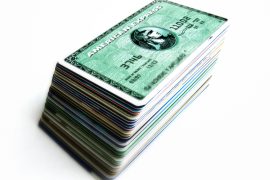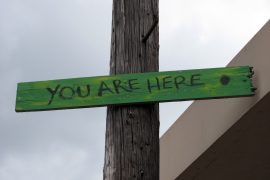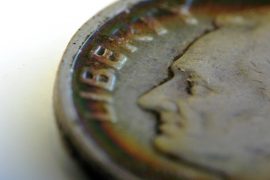your New Years resolution is to save money — or spend less — most financial folks will tell you one thing: you’ve gotta have a budget. This means figuring out what you earn and how to spend those earnings. Budgets can be complex or simple. It all depends on what you are comfortable with. (Personally, I go for simple, because all of those details keep me from maintaining good finances. But if I needed to pay off a lot of debt or save a good amount of money, I might suck it up and look at every single penny.)
For today’s post, I thought I’d just print an excerpt of my book, Math for Grownups. Chapter 8 is called “At the Bank,” and it deals with money issues (aside from shopping, transportation or housing, which are covered in chapters 1, 2 and 3).
It’s New Year;s Day, and Darrel is pondering his resolutions over a bowl of black-eyed peas. For sure, he wants to reach level 65 in Purple Heart: World at War. And he wants to ask out that cute girl in the apartment next door.
But Darrel is also sick and tired of worrying about money. He’s got a good job as a computer programmer, but for some reason, he’s still ending up with too many bills at the end of the month. Last year, he had to sell is first-edition Spiderman comic to pick up a little extra cash. He knows he needs to add a really, really boring New Year’s resolution to his list: keeping a personal finances budget.
He vaguely remembers what his high school consumer math teacher told him about budgets. At least he remembers there are three parts: income, regular expenses, and occasional expenses. His income should be greater than all of his expenses put together.
He writes the name of the month at the top of a piece of paper, January, and adds his current monthly income: $2,655.
He’s careful to put his take-home income, not his before-tax income, because that’s all he can spend.
Now he brainstorms all of his regular expenses, including his weekly comic store purchases. Some of his expenses, such as his electric bill vary a bit form month to month, but he adds up the last year’s worth and divides by 12 to get a monthly average.
| Expenses | |||
| Item | Cost | Item | Cost |
| Rent | $800 | College loans | $200 |
| Electricity | $145 | Gas | $100 |
| Water | $21 | Comics | $100 |
| Cell | $80 | Groceries | $400 |
| Internet | $42 | Entertainment | $200 |
| Satellite | $100 | Clothing | $100 |
| Car payment | $360 | ||
| Total | $2,648 |
So far, so good. It looks like Darrel is living within his means, but what will happen when he adds in his occasional expenses? He brainstorms again, consulting his online banking records for guidance.
| Occasional Expenses | ||
| Item | Cost | Total per year |
| Car insurances | $450 every quarter | $1,800 |
| Comic book conventions | $4,200 per year | $4,200 |
| Professional association dues | $500 per year | $500 |
| Dojo fees | $275 per semester | $550 |
| Gifts | $170 per year | $170 |
| Total | $7220 |
He divides that total by 12 to get his average monthly expense: $601.67.
Darrel adds his regular and occasional expenses together: $2,648 + 601.67 = $3,249.67. That’s more than his monthly take-home pay! He’s going to have to cut back. It takes Darrel only a few moments to recalibrate his budget. He’s going to reduce the number of comic book conventions he goes to and cut down his satellite television expenses. With that, he notices that he can put some money each month into his languishing savings account. And if, at the end of the year, he gets that raise he’s been expecting, he can put even more away for a rainy day.
This little bit of math gives Darrel a boost of confidence — enough confidence that he picks up the phone and calls his cute neighbor.
Do you use a budget? If so, what kind? And how has it helped you manage your finances?







Comments are closed.